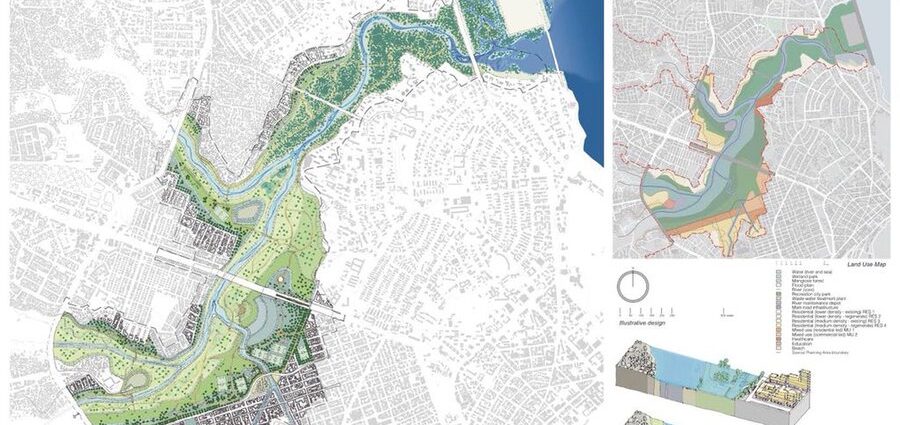Dodoma — Dar es Salaam is on the verge of a major infrastructure facelift as the much-awaited construction of a 600bn/- Jangwani Bridge and development of the Msimbazi valley are scheduled to begin this financial year.
Tanzania Rural and Urban Roads Agency (TARURA) Chief Executive Officer, Eng Victor Seif, told reporters in Dodoma yesterday that the World Bank has issued 260 million US dollars (about 606bn/-) loan for the construction of the Jangwani Bridge and Msimbazi valley development programme.
He said the financing agreement between the government and the WB was signed on Friday last week and the project is expected to be effective from December 31st, this year.
Feasibility studies and architectural designs for the down and up-stream infrastructure of the bridge as well as preparations of the key documents on the environment have been completed, he said.
He said the project is at early stages but promised that construction is set to start before the end of 2022/23 financial year.
“Procedures to get contractors for the project will start next month and the construction works are expected to start within the 2022/23 financial year,” said Eng Seif.
He said since the loan lifespan is six years, he was optimistic that the construction will be completed within the loan time frame.
“The Jangwani bridge construction will not be less than three years and the Msimbazi valley development project will as well spend three years, but the duration will be known exactly after signing contracts of the construction works,” said TARURA CEO.
The project is currently in the preparation process, it will involve the construction of the new bridge and widening and dredging of the river bed from Kawawa Road to Selander Bridge to allow easy flow of rainwater into the Indian Ocean.
He said the government is committed to address rural and urban roads challenges, saying come 2025 almost 85 per cent of the roads network countrywide will be accessible throughout the year.
Eng Seif added that the WB also supported the Roads to Inclusion and Socio-Economic Projects (RISE) by providing 350 million US dollars (about 816bn/-) soft loan financing, which will give rural areas access to roads in good condition to enable them to access services and economic opportunities.
According to Eng Seif, RISE will upgrade roads with climate resilient approaches in six rural districts across four regions — Geita, Tanga, Lindi and Iringa thus promoting a sustainable model for routine maintenance, removing bottlenecks that inhibit the improvement of rural roads, and incorporating people-centered community engagement approaches.
RISE will also generate around 35,000 jobs, including 19,000 community-based routine maintenance contracts involving rural communities, with at least 20 per cent of these jobs held by women.
The project will also assist in laying the foundation for a greater level of ambition for inclusive sustainable rural road asset management in Tanzania, said Eng Seif.
Outlining more on development partners support, he said EU grant under the Agri-connect project will facilitate construction of 43-kilometres of tarmac roads worth 22.5bn/- in the districts of Kilolo, Wanging’ombe, Busokelo and Mbozi saying, the project is currently at the procurement stage.
Eng Seif affirmed the TARURA commitment to repair and maintain the roads network and make the roads passable throughout the year for economic and social access and gains.
He said for cost effectiveness, efficiency and time consumption they have started using alternative tested technologies which engage using raw materials at the construction sites.
He gave an example of the construction of 110 bridges worth 5bn/- by opting to use raw materials at the sites thus saving more that 50 per cent of the actual cost, saying they strive for the durability and standards.
“We are currently testing the soil quality at the construction sites and see if they are worth it through the alternative construction technology.
Eng Seif said in the 2022/23 financial year, TARURA is planning to undertake routine maintenance of 21,595.72 road network kilometres, construction of 422.07km at tarmac level and construction of 11,074.56-km at gravel status.
TARURA in their 2021/25/26 Strategic Plan intends to increase the tarmac roads network from the current 2,404.90-km to 3,855.65-km whereas 4.2tr/- are projected for the construction works.
With a countrywide rural and urban roads network of 144,429.77-kilometres, they will be upgrading them taking into account the government commitment to increase the agency funds.
The Third Five Year-Development Plan (FYDP III) 2021/22) to 2025/26 has placed priority in taking comparative advantage of the geography and size of the country to enhance competitiveness, which include improvement of the road network.
However, according to FYDP III, the challenges besetting the infrastructural sector in Tanzania extend beyond road and transport to unlock Tanzania’s infrastructural potential to attract all sorts of manufacturing and processing industries, the document suggested for a need to hasten implementation of various which included complete construction of 2,500 km of paved roads, construct 6,006 km of paved roads, begin construction of 14 bridges and complete construction of seven bridges
Source: allafrica.com
Share this news
This Years Most Read News Stories

Zanzibar land lease controversy with British Developer
Zanzibar investment lease controversy rumbles on after President Hussein Mwinyi claims the land lease was terminated following a court case which the developer lost Contradictory details come to light.Continue Reading

Tanzania: Samia Hands Over NBC’s 354m/ – Crop Insurance Compensation to Farmers Affected By Hailstorms
President Samia Suluhu Hassan, has handed over a cheque of 354m/- from the National Bank of Commerce (NBC) as compensation to tobacco farmers, who were affected by hailstorms during the previous farming season in various regions across the country.
Handing over the cheque in Dodoma, the compensation is part of the crop insurance service provided by NBC in collaboration with the National Insurance Corporation (NIC).
Furthermore, President Samia has also handed over health insurance coverage to members of the Lindi Mwambao Cooperative Union based in Lindi Region, through the Farmers’ Health Insurance service provided by the bank in partnership with Assurance Insurance Company.
While visiting the bank’s pavilion at the Nanenane Agricultural Exhibition and being received and briefed by the bank’s Managing Director, Mr. Theobald Sabi, she said: “This crop insurance is one of the crucial solutions in ensuring farmers have a reliable income, without fear of challenges such as natural disasters, including hailstorms.
“I call upon all farmers in the country to make the best use of this important opportunity by accessing these kinds of insurance services. I also highly commend NBC and all the stakeholders participating in this programme.”
Elaborating further on the crop insurance service, the Minister of Agriculture, Hussein Bashe, stated that it will help to recover the loss farmers incurred, especially in various calamities beyond their control.
Citing them as floods, fires, and hailstorms, which have significantly affected the well-being of farmers and caused some to be reluctant to invest in the crucial sector, Mr Bashe added: “However, our President, this step by NBC is just the beginning, as this is the second year since they started offering this service, and the results are already visible.

Sign up for free AllAfrica Newsletters
Get the latest in African news delivered straight to your inbox
“As the government, we promise to continue supporting the wider implementation of this service, with the goal of ensuring that this crop insurance service reaches more farmers.”
ALSO READ: NBC participates in TFF 2023/24 awards, promises to enhance competition
On his part, Mr Sabi said that the farmers who benefited from the compensations are from 23 primary cooperative unions in the regions of Shinyanga, Geita, Tabora, Mbeya, Katavi, and Kigoma.
He added: “In addition to these insurance services, as a bank, through this exhibition, we have continued with our programme of providing financial education and various banking opportunities to farmers, alongside offering them various loans, including loans for agricultural equipment, particularly tractors, to eligible farmers.:
At the NBC booth, President Samia also had the opportunity to be briefed on the various services offered by the bank to the farmers namely crop insurance and health insurance services.
There, the President had the chance to speak with some of the beneficiaries of the services, including the Vice-Chairman of the Lindi Mwambao Primary Cooperative Union, Mr. Hassan Mnumbe, whose union has been provided with a health insurance card from the bank.
Source: allafrica.com

US taps Tanzania for infrastructure plan in battle with China for minerals
Washington wants to tap into the country’s minerals, particularly its nickel mines.Continue Reading












